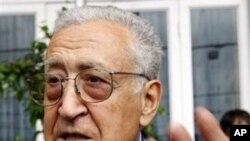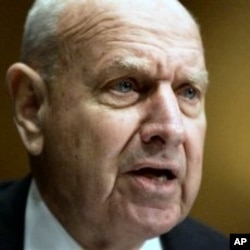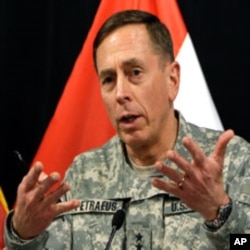A new study by a non-governmental task force concludes there is a growing sense of stalemate in Afghanistan that opens the way for a political settlement in the country.
The task force, created by the Washington-based Century Foundation, says neither side in the Afghan conflict can win militarily and moves toward a political settlement should start now.
Related video report by Robert Raffaele
The task force, made up of a wide range of scholars and former international diplomats, says public support in the West for the war in Afghanistan is declining, the Afghan public is increasingly weary of the continuing conflict, and even the Taliban is under growing pressure to pursue a negotiating track.
In a telephone conference call, task force co-chair Lakhdar Brahimi, a former U.N. Special Envoy to Afghanistan, said none of the Taliban should be barred from such a process if they want to participate.
"The Taliban, as I said, are part of the political scenery in Afghanistan," Brahimi said. "We believe that the Taliban, all the Taliban, are potentially candidates for this reconciliation process."
Fellow co-chair Thomas Pickering, a former U.S. undersecretary of state, said that could even include the top echelons of the Taliban.
"Who speaks for the Taliban? It is not, as we all know, a universally tightly bound organization where it is easy to find a single speaker, although my sense is that on questions theological and maybe political, Mullah Omar and perhaps the association with the so-called Quetta Shura provides an initial base for discussions," said Pickering.
But many of the hardline Taliban have voiced opposition to a political settlement and may choose not to participate in negotiations.
The U.S. commander in Afghanistan, General David Petraeus, said recently the momentum of the Taliban has been halted. Defense Secretary Robert Gates said the United States is well-positioned to begin an initial drawdown of troops in July, when, according to Afghan President Hamid Karzai, Afghan forces will take over security responsibilities in several areas of the country.
The United States is scheduled to withdraw most of its combat troops by 2014, conditions permitting.
Task-force member Lawrence Korb, a former assistant secretary of defense in the Reagan and George H.W. Bush administrations, said the last year’s U.S. troop surge has halted Taliban momentum. But he added that it makes no sense to wait until 2014 to get negotiations going.
"I think that we have reversed the momentum of the Talban, but that it is important to begin the negotiations now," said Korb. "And, as the report said, the longer we wait, it is not going to get better. And I think the optimal time will be this summer, when we start our withdrawal because that will give the Taliban at least some face-saving way out where they can say, well, they were not doing this because of the "[troop] surge. And as we begin to withdraw, this also sends a signal that we are not occupiers and we are not there forever."
The task force says the potentially most promising first step would be the appointment of an internationally designated facilitator who could wade through the complex issues without undermining the various parties' negotiating positions.


